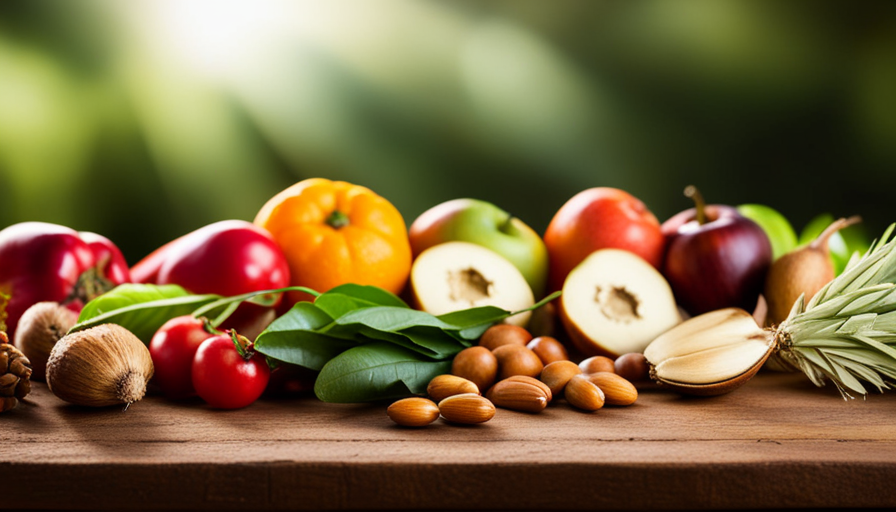Feeling like a limp piece of lettuce on your raw food diet? Fear not! We have the perfect guide to help you get all the essential nutrients while enjoying the benefits of a raw food lifestyle.
Contrary to popular belief, a raw food diet can provide you with all the essential vitamins, minerals, and macronutrients your body craves. In this article, we’ll debunk the myths and show you how to thrive on raw foods.
From incorporating a rainbow of fruits and vegetables to ensuring sufficient protein intake, we’ve got you covered. We’ll even tackle the controversial topic of meeting calcium needs and obtaining vitamin B12 through supplementation.
So grab your juicer and get ready to nourish your body in the most delicious and nutritious way possible. Let’s dive into the world of raw food and discover how to truly thrive!
Key Takeaways
- Incorporate a rainbow of fruits and vegetables to ensure a variety of essential vitamins, minerals, and antioxidants.
- Meet protein needs with plant-based sources like nuts, seeds, legumes, and sprouts.
- Obtain calcium from plant-based sources such as kale, broccoli, almonds, chia seeds, sesame seeds, and seaweed.
- Monitor nutrient levels through regular blood tests and consult with a healthcare professional or dietitian specializing in raw food diets for personalized guidance.
Understanding the Basics of a Raw Food Diet
If you’re new to the world of raw food, you’ll be amazed at how vibrant and colorful your meals can be. Raw food recipes aren’t just nutritious but also visually appealing. Transitioning to a raw food diet involves consuming unprocessed, uncooked, and plant-based foods. By eating raw, you retain the nutrients and enzymes that are often lost during cooking.
To start on a raw food journey, it’s essential to understand the basics. Raw food enthusiasts recommend gradually incorporating raw foods into your diet to allow your body to adjust. Begin by adding more fruits, vegetables, nuts, and seeds to your meals. Experiment with different preparations like salads, smoothies, and raw desserts. This way, you won’t only meet your nutritional needs but also enjoy a diverse range of flavors.
While a raw food diet can provide many health benefits, it’s crucial to ensure you’re getting all the necessary nutrients. A varied and balanced raw food diet should include sources of protein such as nuts, seeds, legumes, and sprouts. It’s also important to consume enough healthy fats from avocados, coconut, and nuts. Additionally, incorporating leafy greens and colorful fruits into your meals will provide essential vitamins and minerals.
Transitioning to a raw food diet can be an exciting and nutritious journey. By exploring raw food recipes and gradually incorporating raw foods into your meals, you can enjoy vibrant and flavorful dishes while meeting all your nutrient needs.
Incorporating a Variety of Fruits and Vegetables
To ensure you’re getting a diverse range of nutrients, try incorporating a colorful array of fruits and vegetables into your daily meals, like a vibrant painter’s palette bringing life to your plate. By including a variety of fruits and vegetables in your raw food diet, you can reap numerous benefits.
Firstly, different colored fruits and vegetables contain various phytonutrients, which are natural compounds that provide health benefits. For example, red fruits and vegetables like tomatoes and strawberries are rich in lycopene, a powerful antioxidant that may help reduce the risk of certain cancers and promote heart health. On the other hand, green leafy vegetables like spinach and kale are packed with vitamins A, C, and K, as well as folate, iron, and fiber.
Additionally, incorporating a wide range of fruits and vegetables ensures you’re getting a good balance of essential nutrients. Different fruits and vegetables contain different vitamins, minerals, and antioxidants, so by consuming a variety, you can ensure you’re meeting your body’s needs. For instance, citrus fruits like oranges and grapefruits are excellent sources of vitamin C, while sweet potatoes are high in vitamin A.
To maximize the nutrient content of your meals, opt for nutrient-rich options such as berries, dark leafy greens, cruciferous vegetables like broccoli and cauliflower, and colorful bell peppers. Remember, the more diverse your fruit and vegetable choices, the wider the range of nutrients you’ll be getting. So, experiment with different varieties and enjoy the benefits of a nutrient-rich raw food diet.
Ensuring Sufficient Protein Intake
Make sure you’re incorporating a variety of protein-rich foods into your meals to ensure you’re meeting your body’s protein needs and fueling your muscles for optimal performance. Protein is an essential nutrient that plays a crucial role in building and repairing tissues, supporting immune function, and producing enzymes and hormones.
While many people believe that protein can only be obtained from animal sources, there are plenty of protein-rich plant foods that can provide all the essential amino acids your body needs.
Here are some alternative protein sources to consider:
-
Legumes: Beans, lentils, and chickpeas are excellent sources of protein. They are also high in fiber, which can help promote digestive health.
-
Nuts and seeds: Almonds, chia seeds, hemp seeds, and pumpkin seeds are all packed with protein. They also contain healthy fats and micronutrients.
-
Chia seeds: These tiny seeds are a complete protein source, meaning they provide all the essential amino acids.
-
Hemp seeds: Hemp seeds are not only rich in protein but also contain omega-3 fatty acids, which are beneficial for heart health.
Incorporating a variety of these protein-rich plant foods into your diet can help ensure that you’re getting all the essential amino acids your body needs. Remember to also vary your sources of protein to maximize nutrient intake and enjoy a well-rounded raw food diet.
Getting Essential Fats from Plant Sources
Incorporate a variety of plant-based fats into your meals, like avocados and olive oil, to support brain health and reduce the risk of heart disease. Did you know that a study found that replacing saturated fats with unsaturated fats, like those found in plant sources, can lower the risk of cardiovascular disease by up to 30%? To ensure you are getting all the essential fats you need on a raw food diet, it’s important to include plant-based sources of omega-3 fatty acids. These fats are crucial for brain function and have been linked to reducing inflammation in the body. Some great plant-based sources of omega-3s include chia seeds, flaxseeds, and walnuts.
In addition to these omega-3 rich foods, there are alternative sources of essential fats that can be incorporated into your meals. Consider adding coconut oil, which is rich in medium-chain triglycerides (MCTs) that can provide a quick source of energy for your body. Another option is hemp seeds, which are a great source of omega-6 fatty acids that are important for healthy skin and hair. Lastly, try incorporating tahini, a paste made from sesame seeds, which provides a good amount of healthy fats.
By including these plant-based sources of essential fats in your raw food diet, you can support your brain health, reduce the risk of heart disease, and ensure you are getting all the necessary nutrients for optimal health.
| Plant-Based Source | Omega-3 Content |
|---|---|
| Chia Seeds | High |
| Flaxseeds | High |
| Walnuts | Moderate |
| Hemp Seeds | Moderate |
Meeting Calcium Needs on a Raw Food Diet
Calcium is essential for maintaining strong bones and teeth, and on a raw food diet, you can ensure you meet your calcium needs by including plant-based sources such as kale, broccoli, and almonds. These calcium-rich plant foods provide a natural and easily digestible way to obtain this vital mineral.
Kale is an excellent source of calcium, with just one cup containing about 90 milligrams. This leafy green also offers the added benefit of being rich in vitamin K, which is important for proper calcium absorption.
Broccoli is another great option, providing around 45 milligrams of calcium per cup. It is also packed with other nutrients like vitamin C, vitamin A, and fiber.
If you’re looking for alternative sources of calcium on a raw food diet, consider incorporating almonds into your meals and snacks. Just one ounce of almonds contains about 75 milligrams of calcium. They’re also a good source of healthy fats and protein, making them a nutritious addition to your diet.
In addition to these plant-based sources, it’s worth noting that calcium can also be found in other raw food items like chia seeds, sesame seeds, and seaweed. While these may not be as high in calcium as kale, broccoli, or almonds, they can still contribute to your overall calcium intake.
Remember, meeting your calcium needs on a raw food diet is achievable by including a variety of calcium-rich plant foods and incorporating alternative sources like almonds and seeds. By doing so, you can ensure you maintain strong bones and teeth while reaping the other health benefits of a raw food lifestyle.
Boosting Iron Levels with Plant-Based Foods
Boost your energy and unleash your inner superhero by fueling your body with plant-based sources of iron that act as a powerful shield against fatigue. Iron is an essential nutrient that plays a crucial role in the production of red blood cells, which carry oxygen to every cell in your body. When your iron levels are low, you may experience decreased energy levels and increased fatigue. Luckily, there are plenty of plant-based foods that are rich in iron and can help boost your energy levels.
One of the best plant-based sources of iron is spinach. This leafy green is not only packed with iron, but it’s also high in vitamin C, which helps your body absorb iron more efficiently. You can easily incorporate spinach into your diet by adding it to salads, smoothies, or sautéed dishes.
Another great source of iron is lentils. These legumes are not only rich in iron but also high in protein and fiber, making them a satisfying addition to any meal. Lentils can be enjoyed in soups, salads, or even as a meat substitute in dishes like lentil burgers.
Managing cravings is another important aspect of maintaining a healthy raw food diet. To curb cravings and keep your energy levels stable, it’s important to focus on consuming a variety of nutrient-dense foods. Incorporating foods like nuts, seeds, and avocados into your diet can help keep you feeling full and satisfied, while also providing important nutrients like healthy fats and protein.
Boosting your iron levels and managing cravings are essential steps in getting all the nutrients you need on a raw food diet. By incorporating these plant-based foods into your meals, you can fuel your body with the energy it needs to thrive and unleash your inner superhero.
Obtaining Vitamin B12 through Supplementation
To ensure optimal health on a plant-based journey, it’s essential to consider vitamin B12 supplementation as it plays a crucial role in maintaining energy levels and supporting overall well-being. Vitamin B12 is primarily found in animal-based products, making it difficult for those following a raw food diet to obtain enough through their diet alone. While some plant-based foods like nutritional yeast and fortified plant milks may contain small amounts of B12, they are not reliable sources for meeting daily requirements. Therefore, supplementation becomes necessary.
Vitamin B12 absorption is a complex process that requires adequate stomach acid and an intrinsic factor, a protein produced by the stomach. It is recommended to take a B12 supplement in the form of cyanocobalamin or methylcobalamin, as they are the most bioavailable forms. The recommended daily intake for adults is 2.4 micrograms, but higher doses may be necessary for those with absorption issues or on a raw food diet.
To make it easier to understand, let’s take a look at the table below, which shows vegan sources of B12 and their approximate B12 content:
| Food Source | Approximate B12 Content (mcg) |
|---|---|
| Nutritional Yeast | 2.4 mcg per tablespoon |
| Fortified Plant Milk | Varies, check labels |
| B12 Supplement | Varies, check labels |
Remember, while it’s important to obtain all your nutrients from whole foods, including a vitamin B12 supplement is a practical and necessary choice for those on a raw food diet.
Ensuring Adequate Vitamin D Exposure
Make sure you spend enough time soaking up the sunshine, as it’s like a natural vitamin D booster for your body, helping to strengthen your bones and uplift your mood. Vitamin D deficiency is a common concern for those following a raw food diet, as this nutrient is primarily obtained from sunlight exposure.
Here are three important reasons why adequate vitamin D exposure is crucial for your overall health:
-
Stronger Bones: Vitamin D plays a vital role in calcium absorption, which is essential for maintaining strong and healthy bones. Without enough vitamin D, your body may struggle to absorb calcium properly, leading to weak bones and an increased risk of fractures.
-
Enhanced Immune Function: Vitamin D is known for its immune-boosting properties. It helps regulate the function of immune cells, reducing the risk of infections and promoting overall immune system health.
-
Mood Improvement: Sunlight exposure triggers the release of serotonin, often referred to as the ‘feel-good’ hormone. Adequate levels of vitamin D can help alleviate symptoms of depression and improve overall mood.
To ensure you are getting enough vitamin D, aim for 15-30 minutes of sunlight exposure on your bare skin, at least two to three times a week. Remember to always practice safe sun exposure by avoiding peak sun hours and wearing sunscreen to protect your skin.
Hydrating Properly with Raw Food
Quench your body’s thirst and replenish your hydration levels by incorporating plenty of fresh, water-rich fruits and vegetables into your daily routine. Proper hydration is essential for overall health and plays a crucial role in maintaining optimal bodily functions.
When following a raw food diet, it’s important to pay attention to your fluid intake and ensure that you’re hydrating properly.
Raw fruits and vegetables are not only packed with essential nutrients but also contain a high water content, which can help keep you hydrated. Some excellent choices include watermelon, cucumber, strawberries, and lettuce. These foods not only provide hydration but also offer a wide range of vitamins, minerals, and antioxidants that are vital for your body’s proper functioning.
In addition to consuming water-rich foods, it’s also important to maintain electrolyte balance. Electrolytes, such as sodium, potassium, and magnesium, help regulate fluid balance, nerve function, and muscle contractions. Raw foods like coconut water, celery, and bananas are rich in electrolytes and can help replenish your body’s electrolyte levels naturally.
Remember to listen to your body’s thirst signals and drink water regularly throughout the day. Aim to drink at least eight glasses of water daily, and increase your intake during hot weather or when engaging in intense physical activity.
By hydrating properly and maintaining electrolyte balance, you can support your overall health and well-being while following a raw food diet.
Monitoring Nutrient Levels and Consulting a Professional
Ensure you stay on track with your nutrient levels and seek guidance from a professional to optimize your health and well-being while following a raw food lifestyle. Monitoring your nutrient levels is crucial to ensure that you are getting all the essential vitamins, minerals, and macronutrients your body needs. While a raw food diet can provide a wide array of nutrients, it is important to be mindful of potential deficiencies.
One way to monitor your nutrient levels is through regular blood tests. These tests can assess your levels of key nutrients such as vitamin B12, iron, and calcium. By keeping a close eye on these levels, you can identify any deficiencies and take appropriate action to address them.
Additionally, consulting with a healthcare professional or registered dietitian who specializes in raw food diets can provide valuable guidance. They can help you create a well-rounded meal plan that incorporates a variety of raw foods to meet your specific nutrient needs. They can also recommend supplements if necessary to ensure you are meeting all your nutrient requirements.
Incorporating a variety of raw fruits, vegetables, nuts, and seeds into your diet is essential to maximize nutrient intake. To help you understand which nutrients are found in various raw foods, here is a table highlighting some key nutrients and their sources:
| Nutrient | Sources |
|---|---|
| Vitamin C | Citrus fruits, strawberries, bell peppers |
| Vitamin A | Carrots, sweet potatoes, kale |
| Calcium | Almonds, sesame seeds, leafy greens |
| Iron | Spinach, lentils, pumpkin seeds |
| Omega-3s | Flaxseeds, chia seeds, walnuts |
By monitoring your nutrient levels and seeking professional guidance, you can ensure that you are getting all the necessary nutrients while following a raw food diet. Remember, everyone’s nutrient needs are different, so it’s important to tailor your diet to meet your individual requirements.
Frequently Asked Questions
Can I still get enough protein on a raw food diet?
You might be surprised to learn that there are plenty of protein sources available on a raw food diet. In fact, did you know that almonds, hemp seeds, and spirulina are all excellent sources of protein?
These foods can help you meet your nutritional needs and ensure you’re getting enough protein. So, rest assured that you can still get all the protein you need while following a raw food diet.
What are some good plant sources of essential fats?
Top tips for incorporating essential fats into a raw food diet include adding flaxseeds, chia seeds, and hemp seeds to your meals. These plant sources are rich in omega-3 fatty acids, which have numerous benefits for your health. Omega-3s support brain function, reduce inflammation, and promote heart health.
Additionally, you can include avocados, olives, and coconuts in your diet for healthy fats. By incorporating these nutrient-dense foods, you can ensure you’re getting all the essential fats your body needs on a raw food diet.
How can I meet my calcium needs on a raw food diet?
To meet your calcium needs on a raw food diet, focus on incorporating calcium-rich plant foods such as leafy greens, sesame seeds, almonds, and chia seeds. Additionally, getting enough vitamin D is important for calcium absorption. While it may be challenging to obtain vitamin D solely from raw food sources, you can consider spending some time in the sun or taking a vitamin D supplement. Regularly monitoring your nutrient levels and consulting a healthcare professional can help manage potential deficiencies on a raw food diet.
Is it possible to boost iron levels with plant-based foods alone?
Yes, it’s possible to boost iron levels with plant-based foods alone. Incorporating iron-rich foods like legumes, dark leafy greens, and tofu into your raw food diet can help increase your iron intake. Iron is essential for energy production and managing weight, as it plays a crucial role in transporting oxygen throughout the body. Remember to pair these foods with sources of vitamin C, such as citrus fruits or bell peppers, to enhance iron absorption.
Do I need to take vitamin B12 supplements on a raw food diet?
Yes, you need to take vitamin B12 supplements on a raw food diet. Vitamin B12 deficiency is a common challenge for those following a raw food diet because this nutrient is mainly found in animal products. Since a raw food diet eliminates most animal products, it can be difficult to obtain enough vitamin B12 through food alone. Therefore, it’s recommended to take B12 supplements to prevent deficiencies and maintain optimal health on a raw food diet.
Can I Get All the Necessary Nutrients from a Raw Food Diet?
Yes, by following raw food diet, it is possible to get all the necessary nutrients, including vitamins, minerals, and antioxidants. Raw vegetables, fruits, nuts, and seeds contain essential nutrients that support overall health. However, it’s important to carefully plan a raw food diet to ensure all nutritional needs are met.
Conclusion
Congratulations! You’ve successfully navigated the world of a raw food diet. By incorporating a wide range of fruits and vegetables, ensuring sufficient protein intake, and getting essential fats from plant sources, you’ve taken a big step towards meeting your nutrient needs.
Remember to monitor your nutrient levels and consult a professional if needed. Don’t forget to stay hydrated and expose yourself to adequate vitamin D.
With a little planning and attention, you can thrive on a raw food diet and enjoy all the health benefits it has to offer. Keep up the good work!










